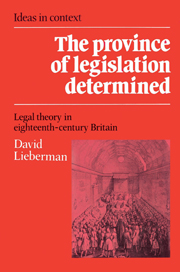Book contents
- Frontmatter
- Contents
- Preface
- Abbreviations
- Introduction
- I Blackstone and the Commentaries
- II The judiciary
- 3 Equity, principle and precedent
- 4 Legal principles and law reform
- 5 Mansfield and the commercial code
- 6 Common Law, principle and precedent
- 7 Kames, legal history and law reform
- 8 Kames and the principles of equity
- III Parliamentary statute
- IV Bentham
- Conclusion: The province of legislation determined
- Bibliography
- Index
4 - Legal principles and law reform
Published online by Cambridge University Press: 10 October 2009
- Frontmatter
- Contents
- Preface
- Abbreviations
- Introduction
- I Blackstone and the Commentaries
- II The judiciary
- 3 Equity, principle and precedent
- 4 Legal principles and law reform
- 5 Mansfield and the commercial code
- 6 Common Law, principle and precedent
- 7 Kames, legal history and law reform
- 8 Kames and the principles of equity
- III Parliamentary statute
- IV Bentham
- Conclusion: The province of legislation determined
- Bibliography
- Index
Summary
Even before the completion in 1788 of his thirty-two-year career as Chief Justice of the Court of King's Bench, Mansfield's contemporaries came to view his judgeship as a unique episode in legal creativity and innovation. Admirers hailed “the founder of the commercial law” of England, while critics protested that “no period of English law of whatever length” might be produced “wherein so many of its settled rules have been reversed as during the time of this judge.” His most fulsome eulogist, Lord Campbell, celebrated the jurist who had achieved “more for the jurisprudence of this country than any legislator or judge or author who has ever made the improvement of it his object.” His most shrill detractor, Junius, condemned the figure who had “made it the study and practice of his life to undermine and alter the whole system of jurisprudence in the Court of King's Bench.”
The published evidence of Mansfield's judicial achievement is contained in a dozen-odd volumes of eighteenth-century law reports. These are an important source which deserve greater attention from historians of eighteenth-century social and political ideas. But they also present special problems which warrant no less careful consideration. Throughout the period England still lacked any official system of standard law reporting.
- Type
- Chapter
- Information
- The Province of Legislation DeterminedLegal Theory in Eighteenth-Century Britain, pp. 88 - 98Publisher: Cambridge University PressPrint publication year: 1989
- 1
- Cited by

